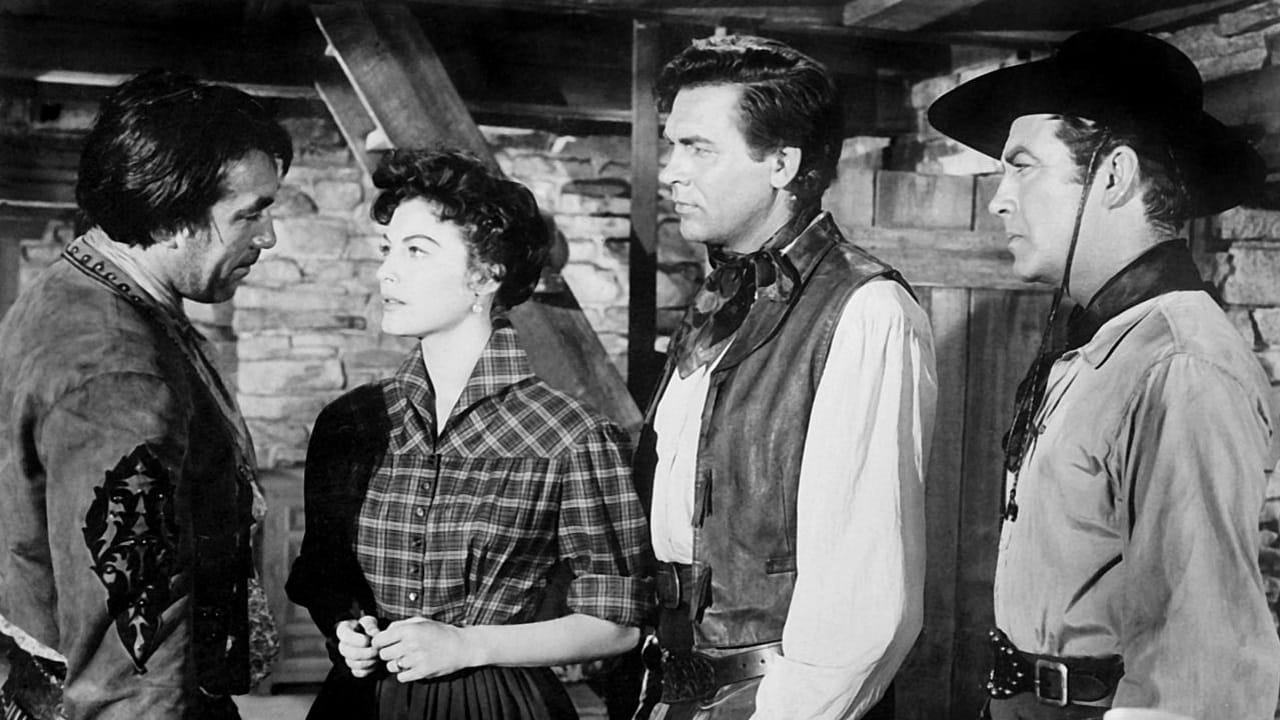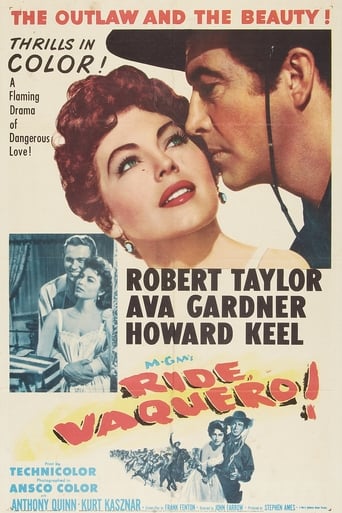

Not even bad in a good way
... View MoreJust perfect...
... View MoreDon't Believe the Hype
... View MoreThere is, somehow, an interesting story here, as well as some good acting. There are also some good scenes
... View MoreEven though it's not great, Quinn's performance is memorable and he really looks - and plays - the part.I'm also intrigued by a couple of brief scenes in this film - a wide shot of a cavalry fort and the shot of mounted troopers riding out look awfully like they came from "She Wore A Yellow Ribbon". Did John Ford help the producers fill a couple of small gaps?Howard Keel looked much more at home in "Pagan Love Song".Robert Taylor looks like he wore his "Billy the Kid" duds again.It's difficult to find a good, crisp copy of the film, but worth the effort.
... View MoreRIDE VAQUERO is something of an undeservedly underrated and, for the most part, forgotten western! A pity really because it has quite a lot going for it and not least a blistering performance from the great Anthony Quinn. Produced by Stephen Ames for MGM in 1953 it was nicely written by Frank Fenton and had workmanlike direction by John Farrow. Barely missing the Cinemascope process by just a matter of weeks (MGM's first production in the new format "Knights Of The Round Table" would premiere less than six months after Vaquero) it was nevertheless beautifully photographed in the new Ansco Colour by the great Robert Surtees. The movie also has a sterling cast! From the upper echelons of MGM's casting department it boasted the presence of Robert Taylor, Ava Gardner, Anthony Quinn and trying out a dramatic role for size singing star Howard Keel.The Civil War has ended and rough-hewn Mexican bandit leader Jose Esqueda (Quinn) is out to prevent Americans resettling into ranch life. His right hand man is his adopted brother - the quiet and sullen Rio (Taylor) who dislikes Esqueda's violent methods of doing business. When Rio - at the behest of his brother - attempts to burn out the ranch of newcomer King Cameron (Keel) and his lovely wife Delia (Gardner) he is captured by Cameron (a good chase sequence) and given the choice of either going to jail or working for him. Out of his attraction for Delia he chooses the latter to the chagrin of Esqueda which leads to great enmity between the brothers and which in the end must come to a fatal confrontation.Although the Rio character is a subdued and sullen individual Taylor in the role does give a good and admirable performance as the gunman and Keel isn't bad either in one of his rare straight roles. But it is Quinn's picture without any doubt! The man was such a superb performer! With that infectious laugh he is a delight to watch and should have received an Oscar for his portrayal here of the rough, fiery and at times highly amusing outlaw (and watch out for Quinn the artist in a scene in the bandit's hideout whittling at the wooden bust of a horse's head with a knife - the actor's own creation no doubt!)This handsomely mounted movie is also buoyed by an excellent score by Polish composer Bronislau Kaper. The main title theme is a wonderful rhythmic Mexican piece with a stuttering Mariachi trumpet and Flamenco guitar. The composer also adopted some Mexican folk tunes such as "La Abandonada" which he fashioned into a gorgeous orchestral love theme. The sprightly recurring cue for Esqueda is reiterated, this time by augmented orchestra, into a rousing march for the picture's brilliant set piece as the bandit leader marshals his forces for the invasion of a border town (a stunning long shot of groups of riders converging from all corners to join with him) and Kaper's music driving them on. RIDE VAQUERO is one of the composer's best efforts! Bronislau Kaper(his first name often misspelled on some movie credits with a W instead of a U) was an interesting composer and was one of the great writers of film scores of The Golden Age but without gaining the celebrity enjoyed by Newman, Steiner, Tiomkin or even Miklos Rozsa his more famous and accomplished composing colleague at MGM. He came from Warsaw and joined MGM as a song writer in 1936. One of the songs he wrote was the title tune for the Clark Gable/Jeanette McDonald classic "San Francisco" (1936) which even today remains a favourite anthem. He scored over a hundred films, 99 per cent of them for MGM which earned him the nickname "The Metronome". In 1952 he won an Acadamy Award for the MGM Lesile Caron musical "Lili" featuring his great song hit "Hi Lili, Hi Lo". Ten years later when Miklos Rozsa turned down the job of scoring the Marlon Brando version of "Mutiny On The Bounty" (1962) it fell to Kaper. The Bounty would elicit from him his greatest score! Bronislau Kaper died in 1983 at the age of 81.RIDE VAQUERO is a better film than its reputation reveals. It warrants a reassessment! There is more to it that should be investigated! It is certainly worth it for Quinn's amazing performance, Surtee's magical Cinematography and Kaper's winning score!Classic line from RIDE VAQUERO:Howard Keel to Robert Taylor "Not a very nice place to bring a civilized woman to!... Is it?" To which the stoic Taylor dryly responds... "I couldn't tell you I never met one"!
... View MoreRobert Taylor thought this movie to be one of his worst! But years later it has come into favor, not only for the unique story line, but because of his performance of the outlaw Rio. He is so unhappy, so silent, so restrained, that when we see him falling in love with Ava Gardner, we almost can not believe it. Anthony Quinn gives a wonderful performance as the head of the gang, he is dirty, drunken, and vicious, the complete opposite of Rio. Esqueda (Quinn) wants to run off all the ranchers, because they bring with them law, and civilization. His time has come, and he knows it. When Howard Keel (Cameron) brings Ava (Dehlia)to his ranch to start a cattle kingdom, she becomes restless and lonely because at every turn, Esqueda burns and ravishes their home. Quinn sees the changes in Rio when he spots him longing, from a distance, after Dehlia. When Taylor is caught after a raid by Keel, he offers him a job, at which point he leaves Quinn, because he wants to be close to Ava. His character is very conflicted by loyalty to Quinn, and his love for Gardner. He knows that they will meet and one will kill the other. He stays anyway, and in the pursuit of horses, saves Keel's life, for which Keel feels vindicated, because he always felt that Rio had some good in him, not knowing that \ he is in love with his wife. He leaves the ranch for a business trip, and when Ava asks Rio to take her to Quinn, so she can plead with him for her new life, he takes her there. When she threatens Quinn, she only stops when he tells her if she kills him she will also be killing Rio, because the gang will take his life. When they return to the ranch, she confronts Rio about the real reason he is there, and in the encounter he asks her why she saved his life. She is so needy, and lonely that she tries to seduce Taylor, and kisses him with such a hunger, that you can feels her needs thru the screen. He rejects her, slapping her, and leaving the home, knowing that he loves her, but that he is no good for her, and that Keel is the right man for her. Esqueda goes on the rampage, and they have a final showdown, where they are both killed. It is quite sad to see Ava, so conflicted, so unsure, seeing Rio dead, and knowing that he did it for her. She asks Keel for forgiveness, and he tells her that he can forgive anything that she can forget. A very interesting portrayal by all. A truly overlooked western, years ahead of its time in the films that would follow. Films that came out of the new Hollywood, method actors, method films. This could really be called a "method western."
... View MoreBefore I saw this movie, I had not heard of the director John Farrow. After some research I found that he was the father of Mia Farrow. I also found that he had good writing skills. This is apparent after you view this film closely. The lead characters are Rio (Robert Taylor) and Esqueda (Anthony Quinn) who turn out to be each others alter ego--one man slaps a woman who kisses him and the other kisses a woman before she slaps him.It's an unusual western because there is no hero--only a handsome troubled anti-hero. It is an unusual western in that Mexicans are not always painted as bad or stupid--it presents them as human beings. Even the 'bad' Esqueda has reverence for God's blessings. This probably is a result of Farrow's Catholicism as it is in the case when the priest gives the final blessings to the dead anti-hero (whose body is not shown, for some strange reason). An unusual way to end a film. Evidently Farrow espoused family values--the couple's marriage is strengthened and Rio says his adopted mother would not have approved of her son Esqueda's actions. The family bonds between Rio and Esqueda are the cornerstones of the script, with doses of Catholicism and social comments thrown in. Something tells me the film we see today is not what the director intended to show--perhaps the studios had their say. The loose editing makes one wonder what was going on.As far as performances, I think this is one of Quinn's finest unsung performances. Taylor is handsome and plays the dark anti-hero well--predictably dressed in dark colors. Ava Gardner's role is supposed to be heroic--dressed in white--but is it so simplistic to dismiss it as such. Is it a coincidence that she behaves differently when she wears pink?It is a strange and a fascinating trio--Taylor, Quinn and Gardner. Farrow had, in my view, a great chance to make a memorable film but somehow fumbled.
... View More